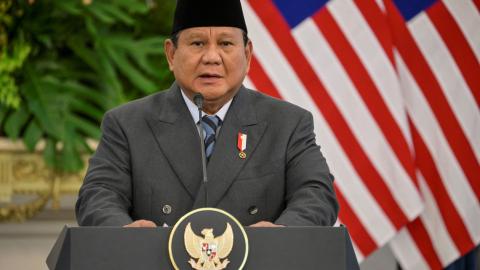While there are continued disputes about the compatibility of Islam and democracy, many Muslim-majority democracies exist. However, most draw comparatively less attention, as they lie outside the world’s focus on the Middle East.
Now, many of these democracies are under threat. The traditionally open Muslim countries of West Africa, such as Senegal and Mali, have been destabilized by ISIS and kindred groups, followed by interventions from the now-defunct Wagner Group and other Russian proxies.
The largest Muslim-majority country, Indonesia, is also facing threats—though from very different, internal sources.
In the years following the 1998 collapse of Suharto’s authoritarian regime, Indonesia came to be regarded as a democratic success story in Southeast Asia. It has held regular, competitive elections, empowered a vibrant press and civil society, and established independent institutions that symbolized a decisive break from authoritarian rule. It also maintained steady economic growth that improved the lives of most of its citizens.
But Prabowo Subianto’s 2024 election as president has raised concerns. A former commander of Indonesia’s special forces, he was accused of violently repressing demonstrators in 1998, was subsequently dismissed from the military, and was barred from entering the U.S. However, he accepted the results when he lost two previous presidential races and—despite some chicanery—was the clear winner in 2024.
One concern is his relationship with Russia. He led Indonesia into BRICS, a bloc of non-aligned countries whose most influential members are Russia and China. He skipped the June 2025 G7 meetings in Canada to meet with Putin. Russia is also Indonesia’s largest supplier of arms.
His officials countered that he would have been a mere spectator at the G7, whereas with Putin he could have a substantive face-to-face meeting. Probably the main appeal of Russia for Indonesia is that it is influential but neither China nor the U.S.—the two great powers vying for ascendancy in Southeast Asia. Indonesia has consistently avoided taking sides, likely awaiting a clearer outcome in that rivalry.
But the larger problems are domestic.
While Americans dismayed by political polarization might welcome cross-party government, Prabowo has included over 100 people in his cabinet and its adjuncts, potentially undercutting the opposition and the checks and balances essential to democracy.
Similarly, all political parties in the legislature—except for the PDI-P, the largest—are now part of Prabowo’s coalition. The PDI-P’s long-time leader and former President, Megawati Sukarnoputri, has made noises about joining the coalition as well.
This would result in a government without challengers in the legislature, in which all politicians merely echo the leader’s policies.
There is also a government-backed effort to rewrite Indonesia’s official history, announced by Culture Minister Fadli Zon late last year. The new volumes are scheduled for publication in August 2025 to coincide with Indonesia’s 80th Independence Day. Fadli’s statement that the books would “emphasize the positive aspects” of each administration has raised concerns about state-sponsored narrative control.
Most troubling is the increased role of the military, the TNI.
In peculiar incidents, military officers in full uniform have appeared at two university student gatherings. They did nothing overtly aggressive and were polite to students. But their mere presence was highly unusual and raises questions—especially after Prabowo’s negative comments about students and civil society organizations.
Since his election, he has shown deep suspicion toward opposition from civil society. On March 13, he emphasized the need to prevent university students from being influenced by “those who do not want to see Indonesia succeed.” Following a March 15 protest against proposed revisions to military law, an advisor to the defense minister released a video calling the protest illegal and potentially anarchic. In Purwokerto and Merauke, the military intervened in student protests.
Under Prabowo, the government has increasingly relied on the security forces to fill senior bureaucratic roles—undercutting the Reformasi period following Suharto, which sought to separate the military from civilian governance.
On March 20, the legislature—dominated by Prabowo’s coalition—unanimously passed revisions to the Armed Forces Law (Law No. 34/2004). The revised law increases the number of civilian institutions and ministries in which active military personnel can hold positions from 10 to 14 and expands the definition of non-war military operations. The military now even distributes free school lunches.
Prabowo has appointed three-star army general Djaka Budi Utama as director of customs and excise. Inspector General Mohammad Iqbal, an active-duty police officer, has been appointed secretary-general of the Regional Representatives Council (DPD). Former air force officer Walmildan Tsani has been made CEO of the national airline Garuda Indonesia. Active general Novi Helmy Prasetya now leads the state logistics company Bulog.
This expansion of the TNI’s domestic role suggests a revival of the “dual function” (dwifungsi) system under Suharto, in which the military was responsible not only for national defense but also for managing economic and social development. During Suharto’s reign, the military even held appointed seats in parliament.
Now that revisions to the Armed Forces Law have passed, the legislature is considering several other controversial bills—including a draft Criminal Procedure Code, a proposal expanding police powers, and one tightening government control over broadcasting.
A new presidential regulation also allows prosecutors to receive personal protection from both the military and national police—a move critics warn could lead to military interference in the judiciary.
While religious radicalism is indeed rising in Indonesia, the greater threat to its democracy is military-aligned authoritarianism. The two phenomena often exist in a dialectical relationship: authoritarianism squeezes civil society until only the most radical elements—often religious extremists—remain. These radicals then become the only visible opposition. In turn, authoritarians point to their existence to justify further repression.
The future of this pivotal Southeast Asian country remains crucial for the United States as it competes with China for regional influence.
And beyond geopolitics, Indonesia has long served as a democratic exemplar for both the Muslim world and the broader Global South. Preserving that legacy is important—not least for Indonesians themselves.


















